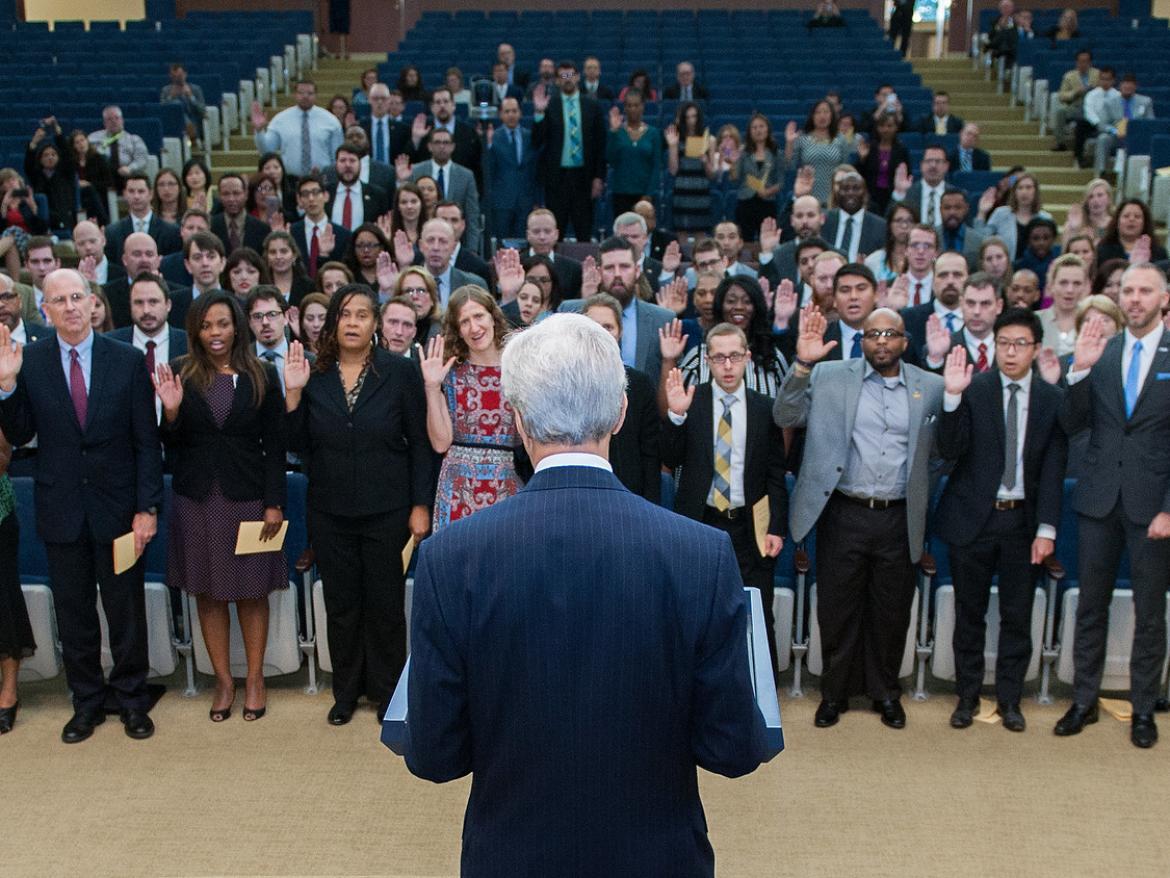Like so many other U.S. government institutions, the Foreign Service has suffered from a long history of systemic racism in its hiring, retention, and promotion practices. Responding to today’s challenges requires a diplomatic corps with a diversity of backgrounds, including race, ethnicity, gender, class, and life experience, who can empathize with and relate to those around the world facing various forms of oppression, injustice and exclusion.
As FCNL recently noted, “to effectively address the expanding economic, gender and racial inequalities around the world, the United States must recognize that diversity and inclusion in personnel and leadership are inseparable from policy decision making.”
From the Beginning
The U.S. Foreign Service, with its competitive exam and merit-based promotions, was created to allow a “real diplomatic career” to “any American citizen who has the necessary qualifications.” However, when Clifton Wharton Sr., an African American, successfully passed the exam a year after it was created in 1925, then-chairman of the Foreign Service Personnel Board, Joseph Grew was outraged and ensured that no other African American entered the Foreign Service for another 20 years. His son, Clifton Wharton Jr. went on to become Deputy Secretary of State under President Bill Clinton.
As with demands for inclusion in so many other American institutions, calls for change at the State Department have received a tepid response. Congressional inquiries, such as those in the 1940s and 1950s by Reps. Jacob Javits and Adam Clayton Powell, Jr., have been met with initiatives and taskforces that failed to bring significant progress. In fact, the State Department has become in some ways less diverse than it was 20 years ago. As is starkly illustrated in the graph below, the pace of change has been painfully slow:
The problem is most severe in the senior ranks of the Foreign Service, where between 2002 and 2018, the percentage of African Americans fell by over half from 7% to 3%. By the end of the Trump administration, of the 189 ambassadors representing the United States abroad just three were filled by African Americans and four by Hispanics, the lowest number since the Ford administration.
Addressing this alarming lack of diversity within America’s Foreign Service is not only a moral imperative but an essential condition for an effective U.S. foreign policy. Research shows, time and again, that a diverse workforce is more effective, creative, innovative, and, especially important for diplomats, has more cultural competency and credibility abroad.
When our Foreign Service, especially its leadership, is not diverse, American diplomacy is less effective. A more diverse cadre of foreign policy professionals more effectively communicates American values, engages broader networks into local communities and provides richer political analysis on local conditions and global trends. As the world becomes more interconnected and complex, a diverse Foreign Service is ensures that U.S. foreign policy is more representative of and better connected to the American public it serves.
Opportunities for change on the horizon
Through the Department of State Authorization Act of 2021 (H.R. 1157), House Foreign Affairs Committee Chairman Gregory Meeks (NY-5) has made clear his priority to strengthen and enhance the diversity of America’s Foreign Service. The bill, approved by the committee on February 25, contains new directives on recruitment, retention, and promotion for a diverse workforce. In his opening remarks as the committee’s first African-American Chairman, he pointedly remarked, “America’s story […] is powerful because it is not a story of a perfect nation, but a nation that strives to be more perfect. That is the symbolism of our nation. That is where we can earn our moral credibility as we re-engage with the world.”
As Chair of the House Foreign Affairs Subcommittee on Africa, Global Health and Global Human Rights, Rep. Karen Bass (CA-37), has re-introduced the bipartisan Represent America Abroad Act (H.R. 1096), to create new career tracks for diverse mid-career professionals to enter the Foreign Service. This program would build on current initiatives, such as the Rangel, Pickering and Payne fellowships, that aim to attract, prepare, and retain early-career professional from a wide variety of backgrounds.
Senate Foreign Relations Committee Chairman Robert Menendez (NJ) also supports efforts to expand representation of women and minorities at the State Department. Together with Sen. Ben Cardin (MD), Chairman Menendez requested the GAO report entitled “State Department: Additional Steps are Needed to Identify Potential Barriers to Diversity,” which provided critical new data on the issue.
Early signs from the Biden administration offer hope for change at the State Department. Late last month, Secretary of State Blinken created a new Chief Diversity and Inclusion Officer (CDIO) position to “align and advance [diversity and inclusion] policies across the department, bring transparency to these initiatives, and hold senior leadership accountable on progress.”
FCNL welcomes these efforts to redress the historic and ongoing inequities within the U.S. Foreign Service and looks forward to working with Chairman Meeks, Chairman Menendez, their respective committees, and the State Department to ensure that diversity continues to be a central and celebrated feature of American diplomacy.


